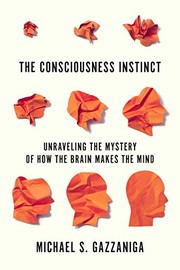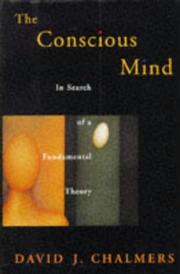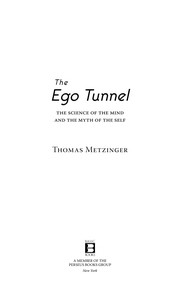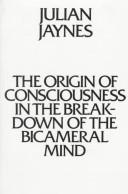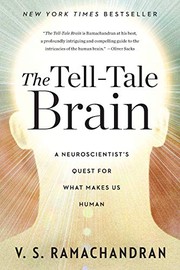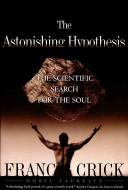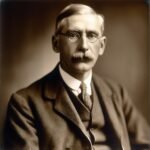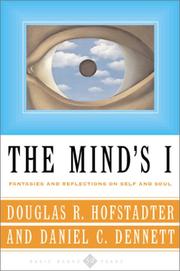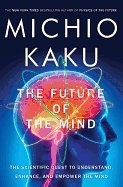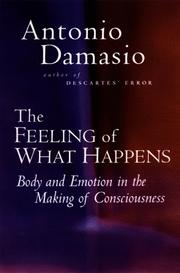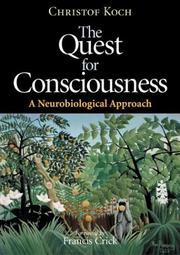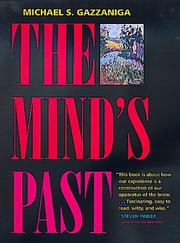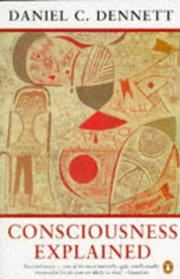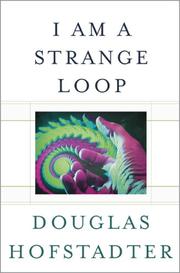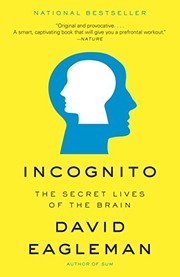Are you ready to delve into the depths of the human mind? Whether you’re a philosopher, psychologist, or simply a curious reader, exploring the concept of consciousness through literature can be an enlightening experience. In this article, we’ve compiled a list of the 20 best books on consciousness that will challenge your thoughts and expand your understanding of the mind. From classic to contemporary works, these books offer diverse perspectives on the nature of consciousness, the self, and the mysteries of human cognition. Get ready to embark on a journey of intellectual exploration and discover the profound insights waiting within these consciousness books.
Contents
- 1 20 Best Consciousness Books
- 2 The Consciousness Instinct: Unraveling the Mystery of How the Brain Makes the Mind
- 3 Consciousness: Confessions of a Romantic Reductionist
- 4 The Feeling of Life Itself: Why Consciousness Is Widespread but Can’t Be Computed
- 5 The Conscious Mind: In Search of a Fundamental Theory
- 6 The Ego Tunnel: The Science of the Mind and the Myth of the Self
- 7 The Origin of Consciousness in the Breakdown of the Bicameral Mind
- 8 The Tell-Tale Brain: A Neuroscientist’s Quest for What Makes Us Human
- 9 The User Illusion: Cutting Consciousness Down to Size
- 10 The Astonishing Hypothesis: The Scientific Search for the Soul
- 11 The Self Illusion: How the Social Brain Creates Identity
- 12 The Mind’s I: Fantasies and Reflections on Self and Soul
- 13 The Future of the Mind: The Scientific Quest to Understand, Enhance, and Empower the Mind
- 14 The Brain and the Meaning of Life
- 15 The Feeling of What Happens: Body and Emotion in the Making of Consciousness
- 16 The Quest for Consciousness: A Neurobiological Approach
- 17 The Mind’s Past
- 18 Consciousness Explained
- 19 I Am a Strange Loop
- 20 Waking, Dreaming, Being: Self and Consciousness in Neuroscience, Meditation, and Philosophy
- 21 Incognito: The Secret Lives of the Brain
- 22 Final Thoughts on Best Consciousness Books
- 23
20 Best Consciousness Books
The Consciousness Instinct: Unraveling the Mystery of How the Brain Makes the Mind
by Michael S. Gazzaniga
The Consciousness Instinct: Unraveling the Mystery of How the Brain Makes the Mind by Michael S. Gazzaniga is a fascinating exploration of the enigmatic workings of the human brain and the emergence of consciousness. In this thought-provoking book, Gazzaniga, a renowned neuroscientist, delves into the intricate mechanisms behind our cognitive abilities and the phenomenon of self-awareness.
With his engaging writing style and deep scientific knowledge, Gazzaniga takes readers on a journey through the complexities of the brain, offering insights into how our minds create a sense of self and perceive the world around us. He discusses the latest research in neuroscience and psychology, shedding light on the nature of consciousness and its evolution.
Whether you’re a student of neuroscience or simply curious about the inner workings of the mind, The Consciousness Instinct is a must-read. Gazzaniga’s exploration of the consciousness instinct is both enlightening and thought-provoking, making this book a captivating and informative read for anyone interested in the mysteries of the human mind.
Consciousness: Confessions of a Romantic Reductionist
by Christof Koch
Consciousness: Confessions of a Romantic Reductionist by Christof Koch is a thought-provoking exploration of the enigmatic phenomenon of human awareness. In this captivating book about consciousness, Koch, a renowned neuroscientist, delves into the mysteries of the mind, offering a unique perspective that combines scientific rigor with a deep appreciation for the profound beauty of consciousness.
Through a series of engaging and deeply personal essays, Koch takes readers on a journey through the intricate workings of the brain, weaving together scientific research, philosophical insights, and personal anecdotes to offer a compelling account of what it means to be conscious. He tackles complex questions about the nature of consciousness and the relationship between the physical brain and the subjective experience of the mind, shedding light on the inner workings of our most profound and elusive trait.
For anyone intrigued by the profound mysteries of the human mind, this book on consciousness is a must-read, offering a captivating blend of scientific inquiry and philosophical contemplation that will leave readers with a deeper understanding of the nature of consciousness.
The Feeling of Life Itself: Why Consciousness Is Widespread but Can’t Be Computed
by Christof Koch
The Feeling of Life Itself: Why Consciousness Is Widespread but Can’t Be Computed by Christof Koch is a fascinating exploration of the enigmatic nature of consciousness. In this thought-provoking book on consciousness, Koch delves into the complex and mysterious phenomenon of awareness, drawing on his extensive research in neuroscience and cognitive science. He argues that while consciousness is widespread across the animal kingdom, it cannot be reduced to simple computational processes, challenging the prevailing view that consciousness can be fully understood and replicated through artificial intelligence.
Koch’s engaging and accessible writing style makes this book about consciousness a compelling read for both experts and curious minds alike. Through a combination of scientific evidence, philosophical insights, and personal anecdotes, Koch provides a comprehensive overview of the current understanding of consciousness and its implications for our understanding of the mind and the nature of reality. The Feeling of Life Itself is a must-read for anyone interested in delving into the depths of the human mind and the mysteries of consciousness.
The Conscious Mind: In Search of a Fundamental Theory
by David J. Chalmers
The Conscious Mind: In Search of a Fundamental Theory by David J. Chalmers is a thought-provoking exploration of the enigmatic nature of the human mind. This groundbreaking book delves into the mysteries of the conscious experience, challenging readers to consider fundamental questions about the nature of consciousness.
Chalmers, a leading philosopher in the field, presents a comprehensive analysis of the mind-body problem and offers a compelling argument for the existence of a ‘hard problem’ of consciousness that cannot be explained solely through physical processes. Through a blend of philosophical inquiry and scientific evidence, Chalmers invites readers to contemplate the profound implications of his theories on the nature of consciousness and its place in the universe.
Whether you are a scholar, a student, or simply a curious mind, The Conscious Mind offers a captivating journey into the depths of human consciousness, provoking introspection and expanding our understanding of the inner workings of the mind. This is a must-read for anyone seeking a deeper understanding of the profound mysteries of consciousness.
The Ego Tunnel: The Science of the Mind and the Myth of the Self
by Thomas Metzinger
The Ego Tunnel by Thomas Metzinger is a thought-provoking book on consciousness that explores the nature of the self and the mind. Metzinger, a renowned philosopher and cognitive scientist, takes readers on a fascinating journey through the science of the mind and challenges the traditional concept of the self as a solid, unchanging entity.
Using a combination of philosophy, neuroscience, and psychology, Metzinger delves into the myth of the self and argues that our sense of self is a constructed reality, or an “ego tunnel,” created by the brain. He discusses the implications of this theory on our understanding of consciousness, free will, and ethical behavior.
Metzinger’s engaging writing style and ability to distill complex concepts make this consciousness book accessible to a wide audience. Whether you are a student of philosophy, a scientist, or simply curious about the nature of the mind, The Ego Tunnel offers a profound and enlightening exploration of the book about consciousness.
The Origin of Consciousness in the Breakdown of the Bicameral Mind
by Julian Jaynes
The Origin of Consciousness in the Breakdown of the Bicameral Mind by Julian Jaynes is a groundbreaking book on the evolution of human consciousness. Jaynes proposes a fascinating theory that suggests consciousness as we know it today was not always present in human history. He argues that in ancient times, people operated under a “bicameral mind,” where one hemisphere of the brain would communicate directives to the other, leading individuals to perceive these commands as the voices of gods or ancestors.
Through meticulous research and analysis of ancient texts and archaeological evidence, Jaynes presents a compelling case for the development of self-awareness and introspection. This consciousness book challenges traditional beliefs about the origins of human consciousness and offers a thought-provoking perspective on the nature of the mind. Whether you’re a psychology enthusiast or simply curious about the workings of the human brain, The Origin of Consciousness in the Breakdown of the Bicameral Mind is a thought-provoking read that will expand your understanding of the human experience.
The Tell-Tale Brain: A Neuroscientist’s Quest for What Makes Us Human
by V.S. Ramachandran
The Tell-Tale Brain: A Neuroscientist’s Quest for What Makes Us Human by V.S. Ramachandran is a captivating exploration of the complexities of the human brain. In this thought-provoking book on consciousness, Ramachandran delves into the mysteries of the mind, unraveling the intricate connections between the brain and our behaviors, perceptions, and experiences.
Through engaging storytelling and compelling scientific research, the author takes readers on a fascinating journey through the labyrinth of the human brain, shedding light on its remarkable abilities and the enigmatic nature of human consciousness. Ramachandran’s insightful observations and innovative theories offer a fresh perspective on the consciousness book, challenging readers to reconsider their understanding of what it means to be human.
Whether you are a neuroscience enthusiast or simply curious about the wonders of the human mind, The Tell-Tale Brain is a compelling and enlightening book about consciousness that will leave you with a deeper appreciation for the marvels of the brain.
The User Illusion: Cutting Consciousness Down to Size
by Tor Nørretranders
The User Illusion: Cutting Consciousness Down to Size by Tor Nørretranders is a thought-provoking book about the human mind and the illusion of consciousness. Nørretranders delves into the complexities of the human brain and challenges our traditional understanding of consciousness. He argues that our perception of reality is a constructed ‘user illusion’ created by our brains, which only allows us to see a fraction of the information available to us. The book explores the concept of consciousness in a way that is both informative and accessible, making it a must-read for anyone interested in the workings of the mind.
Nørretranders presents a compelling argument that will make readers question their understanding of the world around them. The book is filled with fascinating insights and scientific research that shed light on the mysteries of the human mind. Whether you’re a psychology enthusiast or simply curious about the nature of consciousness, this book is sure to expand your understanding of the complexities of the human experience.
The Astonishing Hypothesis: The Scientific Search for the Soul
by Francis Crick
The Astonishing Hypothesis: The Scientific Search for the Soul by Francis Crick is a groundbreaking book on consciousness that delves into the biological and neuroscientific aspects of the human mind. Crick, a Nobel Prize-winning scientist, presents a bold hypothesis that the workings of the mind can be explained through the complex interactions of neurons and brain cells, rather than through any mystical or spiritual essence. This book about consciousness challenges traditional philosophical and religious beliefs about the soul, offering a compelling argument for a purely physical basis for human consciousness.
Crick’s exploration of the brain’s inner workings and the mechanisms behind perception, memory, and thought is both fascinating and thought-provoking. He presents a compelling case for understanding consciousness as a product of the brain’s intricate neural networks, shedding light on the biological underpinnings of human experience. The Astonishing Hypothesis is a must-read for anyone interested in the intersection of science, philosophy, and the nature of consciousness.
The Self Illusion: How the Social Brain Creates Identity
by Bruce Hood
The Self Illusion: How the Social Brain Creates Identity by Bruce Hood is a fascinating exploration of the nature of the self and identity. In this insightful book on consciousness, Hood delves into the idea that our sense of self is not as solid and individual as we might think. Drawing on psychology, neuroscience, and philosophy, he challenges the traditional notion of the self as a separate and independent entity, arguing that it is actually a product of our social interactions and the workings of our brains.
Hood’s exploration of the self as a ‘self-illusion’ is thought-provoking and raises important questions about the nature of human consciousness. He discusses how our sense of self is influenced by our relationships, culture, and societal norms, and how our brains create a continuous narrative to maintain this illusory sense of self. The Self Illusion is a compelling and accessible consciousness book that will make you question the very nature of your own identity.
The Mind’s I: Fantasies and Reflections on Self and Soul
by Douglas R. Hofstadter and Daniel C. Dennett
The Mind’s I: Fantasies and Reflections on Self and Soul is a captivating exploration of the nature of the self and consciousness. Written by Douglas R. Hofstadter and Daniel C. Dennett, this thought-provoking book delves into the complexities of the human mind and the concept of self-awareness. Through a collection of diverse essays, dialogues, and fiction, the authors take readers on a journey through the depths of the human psyche, examining the nature of identity, perception, and the very essence of what it means to be conscious.
From philosophical inquiries to mind-bending thought experiments, The Mind’s I offers a multidisciplinary approach to understanding the enigma of the self. With its blend of literary works, scientific theories, and philosophical musings, this book provides an engaging and profound exploration of the complexities of the human mind. Whether you’re a philosopher, psychologist, or simply curious about the intricacies of consciousness, The Mind’s I is a must-read for anyone interested in unraveling the mysteries of the self and soul.
The Future of the Mind: The Scientific Quest to Understand, Enhance, and Empower the Mind
by Michio Kaku
The Future of the Mind by Michio Kaku is a captivating exploration of the mysteries of the human mind and the cutting-edge technologies that are revolutionizing our understanding of consciousness. In this thought-provoking book, Kaku delves into the realms of neuroscience, psychology, and physics to unravel the complexities of the brain and the potential for enhancing and empowering the mind.
This book on consciousness takes readers on a thrilling journey through mind-bending concepts such as telepathy, telekinesis, and even the possibility of uploading our consciousness into digital form. Kaku’s engaging writing style and ability to distill complex scientific theories into accessible language make this book a compelling read for anyone fascinated by the inner workings of the human mind.
Whether you’re a science enthusiast or simply curious about the frontiers of consciousness research, The Future of the Mind offers a fascinating glimpse into the potential of future technologies and their impact on our understanding of what it means to be conscious.
The Brain and the Meaning of Life
by Paul Thagard
The Brain and the Meaning of Life by Paul Thagard is a captivating book on consciousness that delves into the intricate relationship between the human brain and the search for meaning in life. Thagard, a renowned philosopher and cognitive scientist, offers a compelling exploration of how the brain processes information and constructs our understanding of the world around us, ultimately shaping our perceptions of purpose and significance.
Through a captivating blend of neuroscience, psychology, and philosophy, Thagard presents a thought-provoking analysis of how the brain’s complex workings contribute to our consciousness and the quest for meaning. He skillfully combines scientific research with philosophical insights to offer a comprehensive examination of the fundamental questions that have puzzled humanity for centuries.
With its accessible yet profound prose, The Brain and the Meaning of Life is a must-read for anyone intrigued by the mysteries of the mind and the complexities of human existence. Thagard’s expertise and engaging writing style make this book about consciousness a compelling and enlightening journey into the depths of the human experience.
The Feeling of What Happens: Body and Emotion in the Making of Consciousness
by Antonio Damasio
The Feeling of What Happens: Body and Emotion in the Making of Consciousness by Antonio Damasio is a thought-provoking book on consciousness that delves into the intricate relationship between our physical bodies, emotions, and the process of becoming conscious. Damasio, a renowned neuroscientist, explores how our bodies and emotions play a crucial role in shaping our consciousness, challenging traditional views that separate the mind from the body.
Using compelling research and real-life case studies, Damasio takes readers on a fascinating journey through the inner workings of the human mind, offering profound insights into the nature of consciousness and the role of emotions in shaping our awareness of the world. This consciousness book invites readers to reconsider their understanding of what it means to be conscious, and how our physical experiences and emotional responses contribute to our sense of self and reality.
With its engaging narrative and compelling scientific evidence, The Feeling of What Happens is a must-read for anyone interested in exploring the complex interplay of body, emotion, and consciousness.
The Quest for Consciousness: A Neurobiological Approach
by Christof Koch
The Quest for Consciousness: A Neurobiological Approach by Christof Koch is a thought-provoking exploration of the book on consciousness. Koch, a leading neuroscientist, delves into the mysteries of the mind, offering a captivating book about consciousness that combines cutting-edge scientific research with philosophical insights.
Through a blend of vivid storytelling and rigorous analysis, Koch takes readers on a journey into the depths of the human brain, unraveling the enigma of consciousness. He tackles fundamental questions such as: What is the nature of consciousness? How does the brain generate subjective experience? What are the neural correlates of consciousness?
With a keen eye for detail and a deep reverence for the complexities of the human mind, Koch presents a compelling case for understanding consciousness from a neurobiological perspective. This consciousness book challenges readers to rethink their assumptions about the nature of consciousness and offers a fascinating glimpse into the frontiers of neuroscience.
The Mind’s Past
by Michael S. Gazzaniga
The Mind’s Past by Michael S. Gazzaniga is a captivating exploration of the complexities of the human brain and its role in shaping our consciousness. This thought-provoking book delves into the fascinating world of cognitive neuroscience, offering readers a deep understanding of how the mind processes memories, emotions, and experiences.
Gazzaniga, a renowned neuroscientist, takes readers on a journey through the evolution of the human brain and its impact on shaping our perception of the world. He examines the intricate connections between brain functions and the formation of consciousness, shedding light on the mysteries of human cognition.
With compelling insights and engaging anecdotes, The Mind’s Past offers a comprehensive look at the inner workings of the human mind, making it a must-read for anyone intrigued by the complexities of consciousness. Whether you’re a seasoned neuroscientist or simply curious about the workings of the brain, this book about consciousness is sure to expand your understanding of the mind’s past and its influence on our present and future.
Consciousness Explained
by Daniel C. Dennett
Consciousness Explained by Daniel C. Dennett is a thought-provoking book on the enigmatic topic of the mind. Dennett, a renowned philosopher and cognitive scientist, delves into the complexities of the human mind and offers a comprehensive exploration of the nature of consciousness. Through a blend of philosophy, psychology, and neuroscience, Dennett challenges traditional views on the mind and presents a compelling argument for a new understanding of consciousness.
This groundbreaking book about consciousness invites readers to question their preconceived notions and embark on a journey of intellectual discovery. Dennett’s insightful analysis and accessible writing style make this an essential read for anyone fascinated by the mysteries of the human mind. Consciousness Explained presents a refreshing perspective on the ‘book on consciousness’, offering valuable insights and compelling theories that will captivate and stimulate the reader’s intellect.
I Am a Strange Loop
by Douglas R. Hofstadter
I Am a Strange Loop by Douglas R. Hofstadter is a thought-provoking book about the nature of the self and consciousness. Through a captivating blend of philosophy, psychology, and cognitive science, Hofstadter explores the idea that the “I” we perceive as our self is actually a complex and self-referential pattern within our brains. He argues that this pattern, or “strange loop,” gives rise to our sense of consciousness and identity.
Using engaging examples and analogies, Hofstadter challenges readers to reconsider their understanding of the mind and the nature of consciousness. He delves into questions about the relationship between the mind and the body, the concept of identity, and the implications for artificial intelligence.
This consciousness book is a captivating and mind-bending exploration of the intricacies of the human mind, sure to leave readers with a profound sense of wonder about the nature of their own consciousness.
Waking, Dreaming, Being: Self and Consciousness in Neuroscience, Meditation, and Philosophy
by Evan Thompson
Waking, Dreaming, Being: Self and Consciousness in Neuroscience, Meditation, and Philosophy by Evan Thompson is a captivating exploration of the nature of the mind and consciousness. This thought-provoking book delves into the intersection of neuroscience, meditation, and philosophy to unravel the complexities of the human experience. Thompson skillfully weaves together scientific research, ancient contemplative practices, and philosophical inquiry to offer a comprehensive understanding of the self and consciousness.
Through engaging prose and insightful analysis, the author invites readers to contemplate the nature of their own existence and the intricacies of their conscious experience. This book on consciousness challenges traditional notions of self and consciousness, offering a fresh perspective that transcends disciplinary boundaries. Whether you are a student of neuroscience, a practitioner of meditation, or a curious philosopher, Waking, Dreaming, Being promises to expand your understanding of the human mind and leave you pondering the mysteries of consciousness long after you’ve turned the final page.
Incognito: The Secret Lives of the Brain
by David Eagleman
Incognito: The Secret Lives of the Brain by David Eagleman is a captivating exploration of the hidden workings of the human mind. In this thought-provoking book on consciousness, Eagleman delves into the complexities of the brain, revealing how much of our mental processes occur beneath the surface of our awareness. Through engaging anecdotes and fascinating research, the author sheds light on the enigmatic mechanisms that shape our thoughts, emotions, and behaviors.
With a blend of neuroscience, psychology, and philosophy, Eagleman takes readers on a journey through the consciousness book, challenging conventional notions of self and perception. He uncovers the intricate ways in which our brain operates, from decision-making to memory, and explores the implications of these findings on our understanding of human nature. Incognito offers a compelling and illuminating perspective on the book about consciousness, revealing the profound impact of the unconscious mind on our everyday lives.
Final Thoughts on Best Consciousness Books
Exploring the complex and enigmatic realm of Consciousness through literature can be a transformative and enlightening experience. The 20 best books about consciousness listed in this article offer diverse perspectives and profound insights into the nature of human awareness. Whether delving into the science of the mind, the philosophy of consciousness, or the spiritual dimensions of awareness, these books provide a rich tapestry of thought-provoking ideas and contemplations. Dive into the depths of consciousness with these captivating reads and expand your understanding of this fundamental aspect of human existence.
Which book about Consciousness is best?
The best book on Consciousness can vary with personal preference, but three widely recommended titles are:
- The Consciousness Instinct: Unraveling the Mystery of How the Brain Makes the Mind by Michael S. Gazzaniga,
- Consciousness: Confessions of a Romantic Reductionist by Christof Koch,
- The Feeling of Life Itself: Why Consciousness Is Widespread but Can’t Be Computed by Christof Koch.
Each offers valuable insights and could be a great starting point.
What are the best books to learn about Consciousness?
For those looking to learn about Consciousness, there is a wealth of literature that can provide a comprehensive understanding of the subject. Some of the most highly recommended books include:
- The Consciousness Instinct: Unraveling the Mystery of How the Brain Makes the Mind by Michael S. Gazzaniga,
- Consciousness: Confessions of a Romantic Reductionist by Christof Koch,
- The Feeling of Life Itself: Why Consciousness Is Widespread but Can’t Be Computed by Christof Koch,
- The Conscious Mind: In Search of a Fundamental Theory by David J. Chalmers,
- The Ego Tunnel: The Science of the Mind and the Myth of the Self by Thomas Metzinger,
- The Origin of Consciousness in the Breakdown of the Bicameral Mind by Julian Jaynes,
- The Tell-Tale Brain: A Neuroscientist’s Quest for What Makes Us Human by V.S. Ramachandran,
- The User Illusion: Cutting Consciousness Down to Size by Tor Nørretranders,
- The Astonishing Hypothesis: The Scientific Search for the Soul by Francis Crick,
- The Self Illusion: How the Social Brain Creates Identity by Bruce Hood
These books offer a range of perspectives on Consciousness, covering various aspects and approaches to the subject.
What are the best books about Consciousness?
The best books about Consciousness are:
- The Consciousness Instinct: Unraveling the Mystery of How the Brain Makes the Mind by Michael S. Gazzaniga,
- Consciousness: Confessions of a Romantic Reductionist by Christof Koch,
- The Mind’s I: Fantasies and Reflections on Self and Soul by Douglas R. Hofstadter and Daniel C. Dennett,
- The Future of the Mind: The Scientific Quest to Understand, Enhance, and Empower the Mind by Michio Kaku,
- The User Illusion: Cutting Consciousness Down to Size by Tor Nørretranders,
- The Origin of Consciousness in the Breakdown of the Bicameral Mind by Julian Jaynes.
Each offers unique insights into the subject. While these books about Consciousness are highly regarded, it’s important to note that any list of ‘best’ books is subjective and reflects a range of opinions.
What are the best Consciousness books of all time?
Choosing the best Consciousness books of all time can vary depending on who you ask, but five titles that are often celebrated include
- The Consciousness Instinct: Unraveling the Mystery of How the Brain Makes the Mind by Michael S. Gazzaniga,
- Consciousness: Confessions of a Romantic Reductionist by Christof Koch,
- The Ego Tunnel: The Science of the Mind and the Myth of the Self by Thomas Metzinger,
- The User Illusion: Cutting Consciousness Down to Size by Tor Nørretranders,
- and The Mind’s I: Fantasies and Reflections on Self and Soul by Douglas R. Hofstadter and Daniel C. Dennett.
Each of these books has made a significant impact in the field of Consciousness and continues to be influential today.

